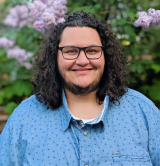We’re thrilled to welcome two new faculty members to our department this year
Dr. Manjeet Birk and Dr. Fady Shanouda!
Manjeet Birk
 Manjeet Birk (she/her) is an interdisciplinary scholar whose work centres the lived experience of racialized and Indigenous girls and women in Canada. Her research focuses on women’s organizing, social justice and institutional racism using critical race, intersectional and decolonizing theories and methodologies. Her interests are grounded in her community activism working with women’s organizations locally, nationally and internationally. Dr. Birk recently returned from a year in Aotearoa New Zealand completing a SSHRC postdoc focused on her project Pathways to Inclusion of Indigenous and Racialized Communities: A Comparative Analysis Between Canada and New Zealand. This project involved collaborating with a team in the Department of Public Health at the Auckland University of Technology, in Auckland NZ to think through systemic and institutional racism particularly as it relates to racialized and Indigenous communities in Auckland. This will form the basis of a comparative analysis between Canada and Aotearoa New Zealand. With a lifetime of experience organizing, troubling and challenging systems, Dr. Birk is always looking for new ways to re-conceptualize a more beautiful world.
Manjeet Birk (she/her) is an interdisciplinary scholar whose work centres the lived experience of racialized and Indigenous girls and women in Canada. Her research focuses on women’s organizing, social justice and institutional racism using critical race, intersectional and decolonizing theories and methodologies. Her interests are grounded in her community activism working with women’s organizations locally, nationally and internationally. Dr. Birk recently returned from a year in Aotearoa New Zealand completing a SSHRC postdoc focused on her project Pathways to Inclusion of Indigenous and Racialized Communities: A Comparative Analysis Between Canada and New Zealand. This project involved collaborating with a team in the Department of Public Health at the Auckland University of Technology, in Auckland NZ to think through systemic and institutional racism particularly as it relates to racialized and Indigenous communities in Auckland. This will form the basis of a comparative analysis between Canada and Aotearoa New Zealand. With a lifetime of experience organizing, troubling and challenging systems, Dr. Birk is always looking for new ways to re-conceptualize a more beautiful world.
To learn more about Dr. Birk’s work, you can also check out this FASS interview: https://carleton.ca/fass/story/disrupting-discrimination/
In the 2021-2022 school year, Dr. Birk will be teaching Introduction to Critical Race Studies (CRST 2001), which introduces students to central tenets of critical race theory, its interdisciplinary debates, applications, and evolutions; and Advanced Critical Race Studies (CRST 4001), which is an interdisciplinary seminar that takes theoretical approaches to anti-colonial and feminist analyses of racial subjugation, and engagements with Black, Indigenous and women of colour feminisms.
Fady Shanouda
 Fady Shanouda (he/him) is a Critical Disability Studies scholar whose research examines disabled and mad students’ experiences in higher education. His scholarly contributions lie at the theoretical and pedagogical intersections of Disability, Mad, and Fat Studies and include socio-historical examinations that surface the interconnections of colonialism, racism, ableism/sanism and fatphobia. He has published scholarly articles on disability/mad-related issues in higher education, Canadian disability history, the anti-fat bias in medicine, and community-based learning. Dr. Shanouda is committed to research that simultaneously impacts academic thought and individuals in the community. To achieve this goal, he created and hosts the podcast “Disability Saves the World” which invites activists, scholars, and artists to speak about how they envision crip/mad/fat thought, activism, and art can save the world. He conducts this research diversely-positioned as a disabled, fat, POC, immigrant and settler who is living, working and creating on the ancestral and traditional territories of the Mississaugas of the Credit, the Haudenosaunee, the Anishinaabe and the Huron-Wendat, and very soon, on the unceded territories of the Algonquin nation.
Fady Shanouda (he/him) is a Critical Disability Studies scholar whose research examines disabled and mad students’ experiences in higher education. His scholarly contributions lie at the theoretical and pedagogical intersections of Disability, Mad, and Fat Studies and include socio-historical examinations that surface the interconnections of colonialism, racism, ableism/sanism and fatphobia. He has published scholarly articles on disability/mad-related issues in higher education, Canadian disability history, the anti-fat bias in medicine, and community-based learning. Dr. Shanouda is committed to research that simultaneously impacts academic thought and individuals in the community. To achieve this goal, he created and hosts the podcast “Disability Saves the World” which invites activists, scholars, and artists to speak about how they envision crip/mad/fat thought, activism, and art can save the world. He conducts this research diversely-positioned as a disabled, fat, POC, immigrant and settler who is living, working and creating on the ancestral and traditional territories of the Mississaugas of the Credit, the Haudenosaunee, the Anishinaabe and the Huron-Wendat, and very soon, on the unceded territories of the Algonquin nation.
In the 2021-2022 school year, Dr. Shanouda will be teaching Introduction to Disability Studies (DBST 2001), which invites students to challenge dominant conceptions of disability and reimagine ideas around independence and capacity; and Mad Studies: Theory and Politics (WGST 3812), which challenges dominant discourses around mental health and highlights mad people’s history through the writings and stories of mad-identified people and scholars.